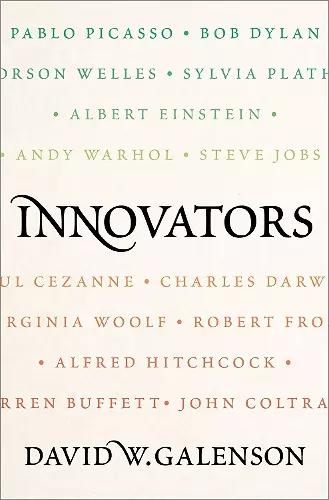Innovators
Format:Hardback
Publisher:Oxford University Press Inc
Publishing:23rd Sep '25
£25.99
This title is due to be published on 23rd September, and will be despatched as soon as possible.

When in their lives are innovators most creative, and why? This book summarizes more than two decades of research prompted by this question. The result is an authoritative statement of a new unified theory of creativity, that overturns both popular and scholarly beliefs about the sources of human inventiveness. David Galenson shows that there are two distinctly different kinds of creativity in virtually every discipline. They result from very different goals and methods, and each produces a specific pattern of discovery over the life cycle. Conceptual innovators make bold leaps to formulate new ideas. The most radical conceptual innovations are made by brash young geniuses, who often lose their creativity thereafter. Great conceptual innovators analyzed in this book include Pablo Picasso, Albert Einstein, Orson Welles, Sylvia Plath, Andy Warhol, Bob Dylan, and Steve Jobs. Experimental innovators make discoveries gradually and unobtrusively, through careful observation and generalization. They gain knowledge over time, and make their greatest contributions late in their lives. Great experimental innovators considered in this book include Paul Cezanne, Charles Darwin, Virginia Woolf, Robert Frost, Alfed Hitchcock, John Coltrane, and Warren Buffett. From analysis of the careers of scores of artists, scholars, and entrepreneurs, this book provides a new understanding of the creative processes of great innovators, and reveals the systematic patterns that underlie the two life cycles of creativity. It will be of interest to anyone who seeks a deeper understanding of the sources of human creativity.
The various chapters in the book offer a comprehensive examination of innovators across diverse domains. * Riccardo Puglisi, Journal of Cultural Economics *
Innovators is a masterful, authoritative, definitive work. Galenson's theory of conceptual and experimental artists has the distinctive revelatory quality of true insight, which is that you feel the truth of it in your bones, and the power of his ideas only grows with the proliferation of examples from across various art forms. As a novelist myself, I can say that Galenson's ideas have helped me understand my own mind, my own creative style-they explained me to myself. * William Landay, New York Times bestselling author *
Too often we associate creativity with the young innovator who burns bright and often flames out, and we neglect the incrementalist who keeps trying to get it right through a long career, but whose body of work may have more of a lasting effect on a discipline or art form or industry than the more familiar kind of 'genius.' Galenson presents detailed portraits of the contributions of a dazzling array of intellectual figures, from Paul Cezanne and Robert Lowell to Charles Darwin and Steve Jobs--all beautifully written and contributing to a convincing argument. Readers of this sparkling book will never see a painting or a building or hear a song or think of their own intellectual development in quite the same way again. * J. Morgan Kousser, Professor of History and Social Science, Emeritus, Caltech *
A wonderful journey through the paths of human creativity. Galenson's celebrated distinction between conceptual and experimental innovators is now applied to new fields of modern art and beyond. You will learn more about the development of great ideas, but you may also understand more about your own creativity. * Federico Etro, Professor of Economics at the University of Florence and Editor of Journal of Cultural Economics *
After his now famous Old Masters and Young Geniuses, David Galenson broadens his pattern of experimental vs conceptual creativity. It is no doubt a fascinating breakthrough in the understanding of a wide variety of innovators, owing to a rare interdisciplinary perspective at the crossroads of economics, art history and sociology. * Nathalie Heinich, Director of Research, Sociology, CNRS, Paris *
ISBN: 9780197745618
Dimensions: 238mm x 166mm x 33mm
Weight: 703g
400 pages